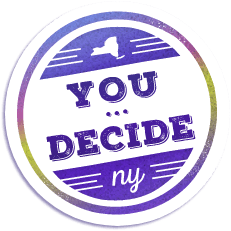Between 20% and 40% of youth are gambling (OASAS, 2022) (Winters and Derevensky, 2019) (OASAS, 2015). We also know that 94% of individuals who struggle with gambling harm will have at least one co-occurring mental health disorder or addiction (Pricel et al., 2021). The earlier we engage in discussions and take action to prevent youth gambling, the better equipped our youth will be as they enter adulthood. Empowering youth to engage in healthy behaviors may help prevent future mental health disorders.
How can you make a difference?
YOUTH
As a youth, you may have the most important role in supporting your peers. You may be the first person to hear of friends and peers struggling with mental health. Mental health includes struggles with anxiety, depression, or anything else that may be causing problems in their life, including gambling.
Any hint that gambling may be causing problems in a peer’s life needs to be addressed. This doesn’t need to be a formal report. Bring your concern to another friend to figure out the next move, a parent to seek guidance, or a teacher or counselor for their support. Keep in mind that it is not anyone’s sole responsibility to support someone else. Working as a team with your friends, parents, teachers, and counselors will offer the best help for your peers in need.
YOUNG ADULT
You are also on the front lines to help friends or peers. You understand the slang, see behaviors, and can identify if a friend or peer needs support. Reach out for advice on how to support a friend or peer. You can start with another friend or parent or go directly to a professional who will know how to guide your next steps.
It’s not necessary to know all about gambling harm or all available resources. No one is expected to know everything on how to support someone with a potential gambling problem. The important thing is to find someone to address your concern and help with the next steps.
PARENTS
Knowing what a youth is doing may be easier than a young adult, but both still require empathy and openness. Keep an open mind and open heart to whatever youth or young adults share with you. Listen to their stories about drama between friends, try to play their video games, and watch their YouTube videos with them. All these are ways to help nurture a relationship with youth and young adults. These are all ways to create open environments to let them know that you care.
With this open environment, you may begin, or continue, to learn more about their lives than you hoped. Listen with an empathetic demeanor and be prepared to guide youth to address a friend or peer’s gambling problem. Work together to empower youth and/or young adults to take action and make a difference in a friend or peer’s life.
COMMUNTY INFLUENCERS
Youth and young adults who bring to your awareness a potential gambling problem are trusting you. They trust you to comfort them and discuss the next steps in the process to support their friend or peer. Whether or not their fear of someone’s gambling problem is correct or not, take the time to discuss what may be happening. Discuss the next steps and follow up to let them know that their friend or peer is getting the support they need.
You do not need to know all the resources and support services available. Making a connection with someone who does know about resources and services only widens the support network. A support network is vital to an individual who needs the support available.
FINDING SUPPORT
If you find yourself struggling with gambling harm, or if you suspect someone you know is facing such challenges, don’t hesitate to seek help. For 24/7 support, call the NYS OASAS HOPEline at 1-877-846-7369 or text 467369. Or choose your county using our interactive map on our NYProblemGamblingHELP.org HOME PAGE to see the contact information for the Problem Gambling Resource Center (PGRC) in your region.

